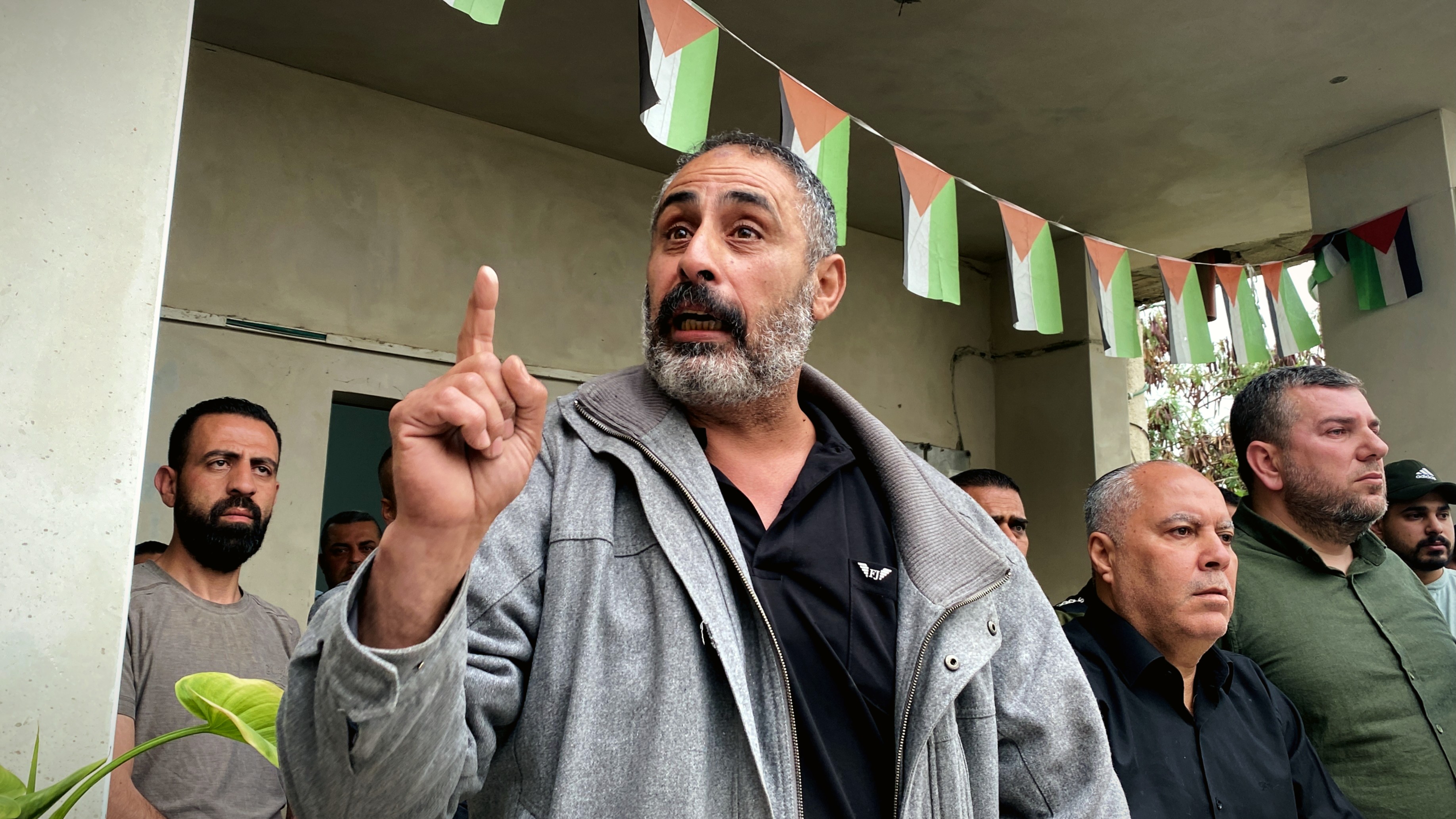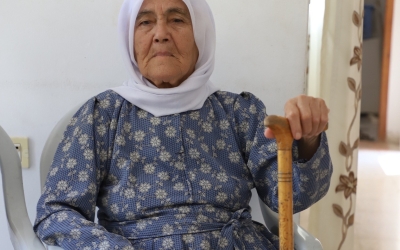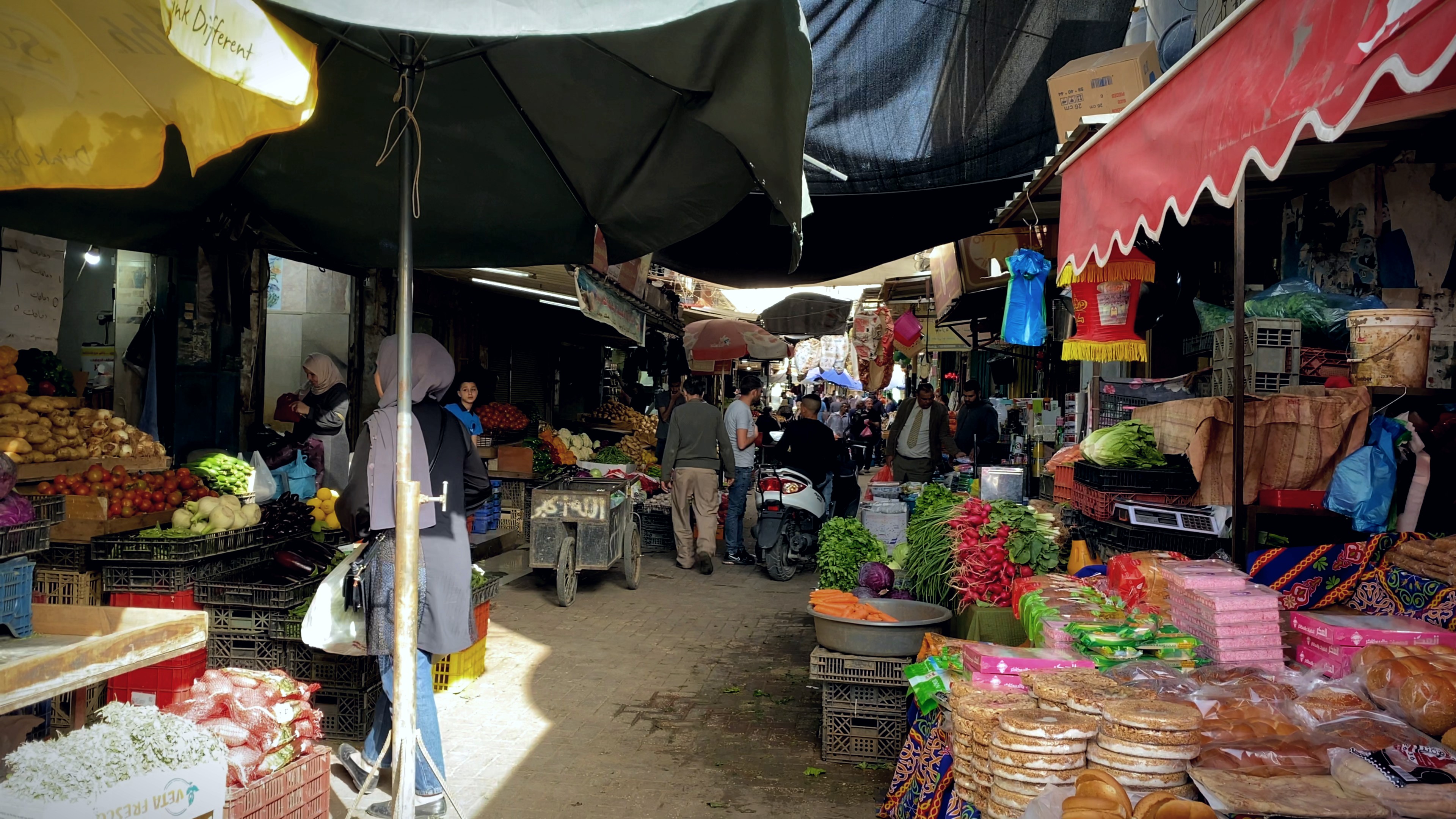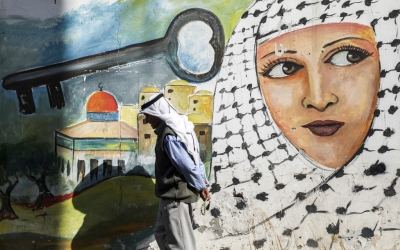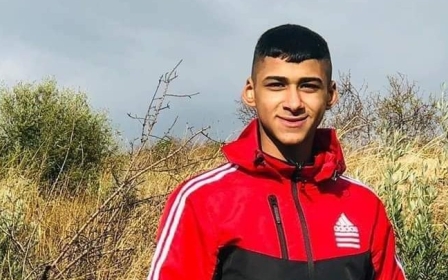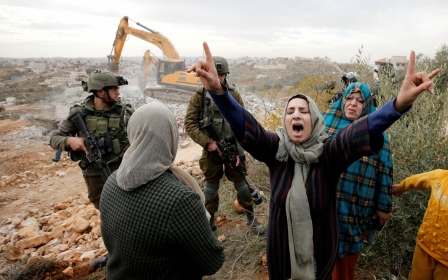Raids, siege and a manhunt: Israel ramps up aggressions against Jenin
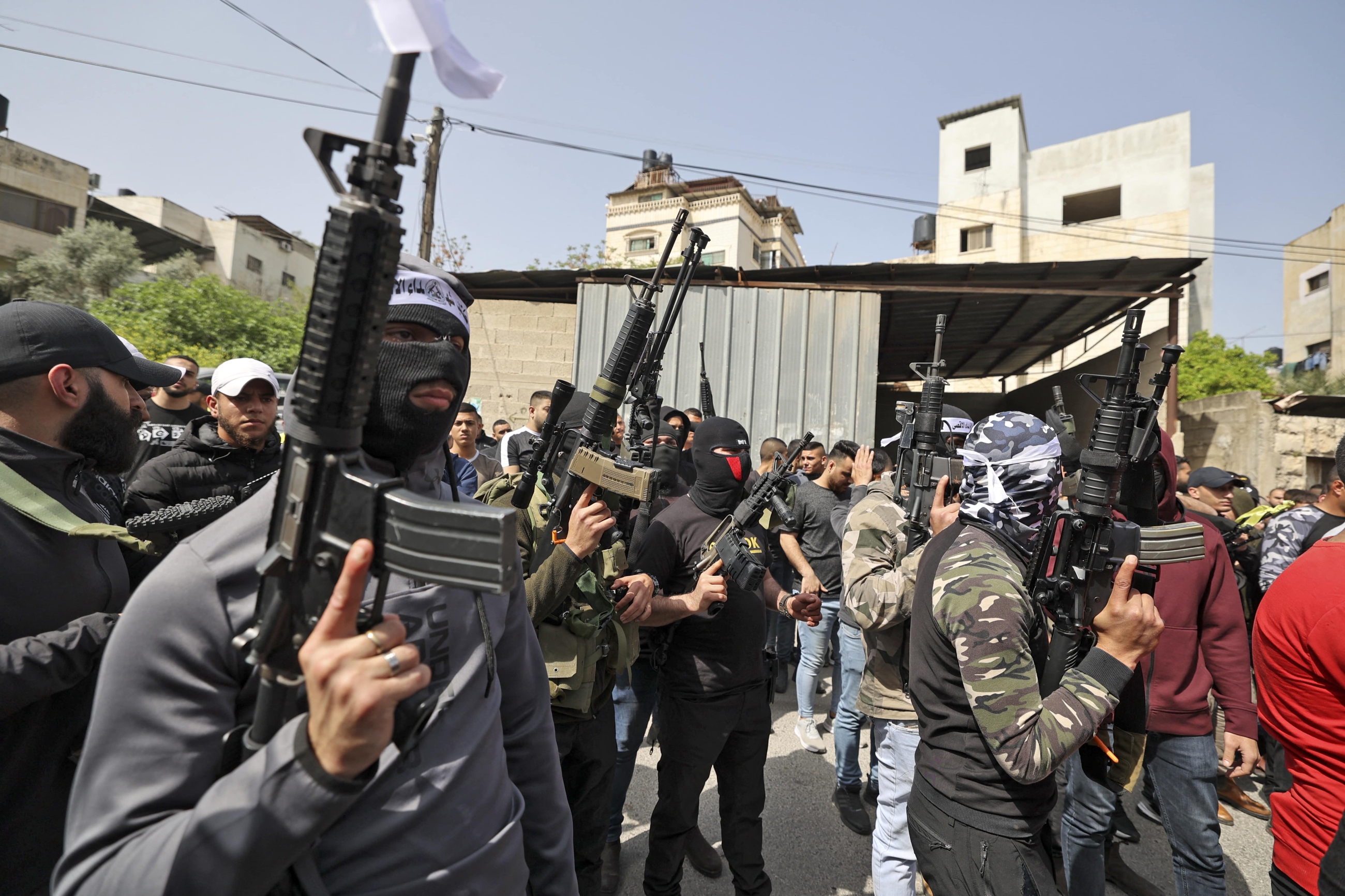
Just as Palestinians marked the 20th anniversary of the 2002 Israeli onslaught on the Jenin refugee camp, residents of the fortified district now find themselves in familiar territory.
Months of Israeli operations and arrests reached their peak on Saturday 9 April, when a rare large-scale raid took place in the camp in the early hours of the morning.
Nearly two hours of street gun fighting ensued, leaving one Palestinian fighter killed and others wounded.
On the same day 20 years ago, 13 Israeli soldiers were killed fighting a similar battle.
The crackdowns in Jenin have been building up for months, if not years. But the deadly shootings in Israel carried out by camp residents Diya Hamarshah and Raad Hazem, which left eight Israelis dead, seem to have pushed Israeli aggressions over the edge.
Since then, Israel has imposed economic sanctions on Jenin, closed off checkpoints, revoked permits to al-Aqsa Mosque visitors, increased deadly raids and manhunts, and carried out targeted killings.
And after two failed attempts to arrest Hazem's family and plans to demolish their home, more Israeli operations are expected in the camp, and with them, more violence is likely to come.
A 'national hero' on the run
The Saturday raid was carried out for two reasons: mapping out Hazem's family home ahead of its demolition and arresting his father Fathi Hazem, who is wanted for interrogation.
Shortly after Raad was killed in Jaffa, after an eight-hour manhunt following his Tel Aviv shooting spree, Fathi was consoled by neighbours and residents who came to his house to show support.
He addressed the crowd in an impassioned speech calling on young people to defend Palestine and continue to rally around him and Palestinian resistance in the camp.
"We grow old and weak," he said while stroking his white beard. "Now we hand over the baton to you."
Since then, he has received many calls from Israeli intelligence officers threatening him and asking him to turn himself in along with his sons.
Fathi refused, telling the officers to ''come get me from the camp". He was offered the body of Raad in exchange, according to Fathi's brother Amin. But, fearing it could just be a set-up, this offer was also rejected.
Fathi's defiance has turned him into a "national hero" in the camp, a senior figure in Jenin, who preferred to remain anonymous, told Middle East Eye.
But with his public standing came increased scrutiny.
"Israel now wants revenge against all the signs of resistance in Jenin refugee camp, specifically against Raad's family, and his father in particular, given their refusal to cooperate," the Jenin leader added.
After the failed attempt to arrest him on Saturday, another special Israeli force targeted two of Raad's brothers while they were driving with their mother east of Jenin, returning from a shopping trip. All three managed to escape unharmed after soldiers opened fire at their fleeing vehicle.
MEE was unable to reach Fathi for an interview as he decided to go into hiding following the weekend's raids. He no longer speaks to the media or frequents public places, and has even stopped going to his son's wake in the camp.
Fathi, a retired Palestine Authority (PA) security forces colonel, is no stranger to such run-ins with Israel, his former comrade-in-arms Jamal Hweil told MEE.
"Fathi stood out wherever he went, even when he was in the leadership of the Palestinian security forces. He would carry himself with the spirit of a freedom fighter, and he would assist the needy and the poor, and the oppressed when he served in Nablus. He is also a karate instructor, and trained people in how to resist," said Hweil, a prominent Fatah leader in Jenin.
The two shared the battlefield during the 2002 invasion of Jenin and prison cells in subsequent years. Their bond is far more than just that of friends, Hweil said.
"In prison, he was always an influencer and was always the most decisive leader. Whenever he would address the young men, he would raise their morale and harden their resolve. Abu Raad [Hazem] is a legend," he added.
"Now his sons and his wife are wanted, an entire family outlawed."
Punitive measures
Another set of measures by Israel that followed the Saturday raid focused on sanctioning the city.
Under the new Israeli restrictions, Palestinians cannot travel between Jenin and Israel, as all checkpoints around the city have been closed. The ban has cut off businesspeople, merchants, workers, and relatives visiting family across the 1949 armistice Green Line.
A vegetable seller, who preferred to remain anonymous, said the measures are already impacting the now-nearly empty markets.
With its fertile lands and proximity to the Green Line, which separates Israel from the West Bank, Jenin is a favoured destination for Palestinian citizens of Israel, who now can't access the city.
Millions of shekels' worth of goods were imported into Jenin specifically for selling during Ramadan and Eid al-Fitr, mostly to Palestinian citizens of Israel.
These goods are now depreciating, Ammar Abu Bakr, head of the Jenin Chamber of Commerce and Industry (JCCI), told MEE, as the closures are estimated to affect 80 percent of Jenin's economy.
Jenin usually receives between 3,000 to 4,000 vehicles from within the Green Line through the now-closed Jalameh checkpoint, a number that multiplies during Ramadan.
Known as the West Bank's breadbasket, Jenin is home to one of the largest fertile plains in Palestine due to its proximity to Marj Bin Amer (the Jezreel Valley). But even the economic vitality of the agricultural sector was impacted by these punitive measures, which blocked agricultural sales inside Israel and the increased accumulation, and hence devaluation, of agricultural produce.
The Israeli authorities also revoked all commercial permits allotted to merchants from the Jenin area - around 2,000 people that used to make the trip across the Green Line daily, and who are now barred from travel, according to the JCCI. Abu Bakr estimates that, between the imposed downturn in commercial activity and the prevention of business across the Green Line, Jenin has suffered a daily loss of around 10 million shekels ($3.1m).
The sanctions go one step further. All carriers of West Bank IDs from the Jenin region have now been barred from entry into occupied East Jerusalem during Ramadan.
This is a revocation of a previous Israeli announcement that allowed women of all ages and men over the age of 50 into Jerusalem to perform the Friday prayers at al-Aqsa Mosque.
The punitive measures represent a "policy of strangulation" according to Abu Bakr, who believes it to be a form of retribution against the camp, which "will not dissuade young Palestinians from seeking freedom".
The impact of the measure, coupled with rising poverty and unemployment, will only further frustration against the occupation by Palestinian youth, Abu Bakr warned.
"They [the Israelis] have been using the policy of the carrot and the stick on us ever since 1967," he said.
Resistance reborn
Israeli actions against Jenin have now put the city on edge. For months, the city, and in particular its central refugee camp, has faced an uptick in Israeli violence.
At least 12 people from the city have been killed since the start of the year, including three resistance fighters who were shot dead in an apparent targeted killing during a pre-dawn ambush on 2 April.
In the same period, around 200 people were detained in various raids.
In late December, the Israeli armed forces' Chief of Staff Aviv Kochavi said in an interview with Channel 12 that Israel was on the cusp of launching a major operation in Jenin.
Israel and the security forces of the PA have joined efforts since late last year to root out an emerging armed presence in the city's camp, which they have not been able to control.
With tensions at an all-time high, Jenin's informal band of fighters, who call themselves the "Jenin Unit," have now gone on high alert. The fighters say their purpose is to defend the camp against Israeli raids.
Around 40 members of the unit, who belong to different Palestinian factions including Fatah, Islamic Jihad, and Hamas, are wanted by Israel.
Over the weekend, Jenin's mosques told civilians through loudspeakers to be alert and avoid the streets.
A group of young men now guard the entrances of the camp to detect any suspicious and unknown vehicles that may be used by undercover Israeli special forces - the "Musta'ribeen" - to infiltrate the camp.
Hweil, a veteran of the 2002 battle, described what is happening today as just another episode of the camp's long history of resistance to the occupation.
In April 2002, the Israeli army besieged the camp, cut off water, food, and electricity, and prevented medical staff from entering before bombing it with F-16 warplanes and artillery shells.
The operation, meant to stamp out Palestinian resistance, led to the killing of dozens of Palestinians, the destruction of dozens of homes, and the displacement of thousands of residents, and became an important symbol of Israel's oppression and of Palestinian resistance.
Twenty years later, the resistance seems to have been reborn, Hweil said.
'Resistance is a result, not a cause, and wherever there is occupation, there will be resistance.'
- Jamal Hweil, Jenin Fatah leader
"The army was unable to decide the battle in its favour, and went in and out of the camp without achieving any real goals, so shall we expect any more from them today?" Hweil said.
"Today, the resistance is much fiercer, because most of the youth that are resisting today were born in the 2002 battle amidst the rubble.
"Every young man either has a father or a brother who is a martyr or a prisoner, or an uncle or family member. Today's generation has only looked to resisting the oppression and injustice visited on the camp and the Palestinian people."
It is hard to predict what will happen in Jenin and across the West Bank in the coming days. But as long as the occupation continues, Hweil argued, the resistance will grow.
"In light of the Judaisation of Jerusalem, the spread of settlements that have eaten into Palestinian land like cancer, the racist separation wall, the theft of agricultural lands, the theft of water resources, the killings on the checkpoints, the arrest of over 5,000 prisoners, the systematic terrorisation - all of this will be met with our resistance," he said.
"Any normal person would resist foreign occupation to be rid of it. Resistance is a result, not a cause, and wherever there is occupation, there will be resistance."
Middle East Eye propose une couverture et une analyse indépendantes et incomparables du Moyen-Orient, de l’Afrique du Nord et d’autres régions du monde. Pour en savoir plus sur la reprise de ce contenu et les frais qui s’appliquent, veuillez remplir ce formulaire [en anglais]. Pour en savoir plus sur MEE, cliquez ici [en anglais].


